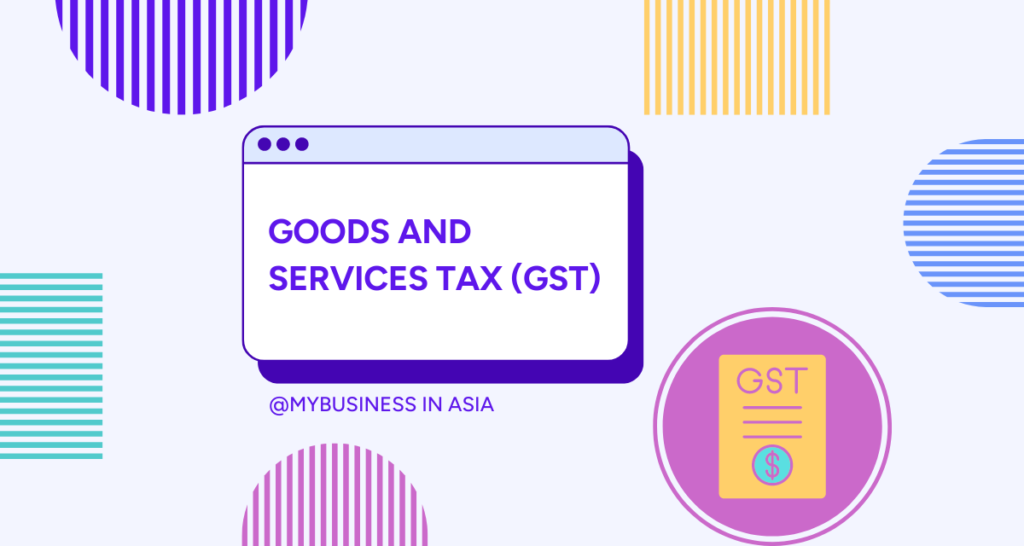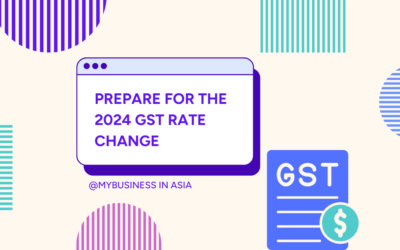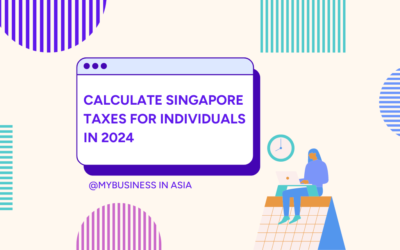
What is the GST?
Goods and Services Tax (GST), also known as Value-Added Tax (VAT) in some countries, is a consumption tax which is levied on almost all goods and services, as well as the import of goods in Singapore. The current GST rate is 7% and will become 8% in 2023 and 9% in 2024.
GST Rate Change in 2023 and 2024
It was recently announced by the Minister of Finance that the GST rate will be increased as follows:
- Be 8% with effect from 1 Jan 2023; and
- Be 9% with effect from 1 Jan 2024.
The increase in revenue from change in GST rate will contribute towards healthcare expenditure and senior care in Singapore.
When is your company required to register for GST?
Registration of GST can be categorized as compulsory registration or voluntary registration.
Compulsory registration
GST registration is compulsory if:
- Your taxable turnover amounted to more than S$1 million at the end of the calendar year, under retrospective basis OR
- Your taxable turnover is expected to exceed S$1 million in upcoming twelve months, under prospective basis.
Registration must be made within 30 days. Under prospective basis, supporting documents such as signed agreements, quotations and invoices will be required to justify forecast value.
In case your business fails to register within time frame, a fine and penalty will be imposed, and you may be liable to prosecution.
You can request an exemption if at least 90% of your taxable turnover is zero-rated supplies, and if the output tax chargeable is less than the input tax claimable on imports and/or purchases from GST-registered suppliers.
Voluntary registration
You may choose to voluntarily register for the Goods and Services Tax (GST). If you qualify and respect applicable conditions, the main benefit of being registered is claiming GST incurred on your purchases.
However, you should note that a voluntarily registered business must remain registered for 2 years. Also, the business must file quarterly GST return within deadline and maintain all records for at least five years even if business has ceased or deregistered from GST.
What are Taxable and Non-Taxable supplies?
Taxable supplies
A taxable supply can either be standard rated or zero rated.
Standard-rated supplies
These are subjected to a GST rate of 7%. Most local goods and services fall under this category.
Zero-rated supplies
Zero-rated supplies are goods which are exported, or services classified as international services. These are subjected to a GST rate of 0%.
In this respect, no output tax is payable to the Inland Revenue Authority of Singapore (IRAS), but a business is entitled to claim input tax used in making these taxable supplies.
Non-Taxable supplies
Non-taxable supplies are categorized under exempt and out of scope supplies. These are not subjected to GST.
Exempt supplies
A business cannot collect GST on exempt supplies and is not entitled to claim input tax. Such goods and services would include the provision of financial services and the sale and lease of residential properties.
Out-of-scope Supplies
These supplies do not fall within the scope of the GST legislation. Indeed, they include sale of goods from outside of Singapore to another place outside Singapore and private transactions.

Disallowed Claims
As a registered business, you can claim GST incurred on business purchases, if the conditions for claiming input tax are respected. However, some input tax claims are disallowed:
- Benefits provided to family members or relatives of your employees
- Costs and running expenditures incurred on company and rental motor cars
- Sports and recreation clubs’ subscription charges
- Medical costs for your employees that are incurred unless they are mandated under the Work Injury Compensation Act or under any collective agreement within the meaning of the Industrial Relations Act
- Medical and accident insurance premiums paid for your employees, unless required under the Work Injury Compensation Act or under any collective agreement within the meaning of the Industrial Relations Act
- Any transaction involving betting, sweepstakes, lotteries, fruit machines or games of chance
Filing and Payment of Goods and Services Tax
A GST F5 form return must be filed to IRAS by all registered businesses.
Filing frequency is normally on a quarterly basis, even if it can be asked to declare the GST on a monthly basis.
Moreover, the due date for filing of return and payment is one month after the end of the accounting period covered by the return.
If you are on GIRO plan, deductions will occur on the 15th day after filling due date.
If you need to have your business registered for the GST, we can assist you with our specific package inclusive of GST. Else you can get in touch with us to discuss your projects!
If you appreciate our content, you will also appreciate our other articles:
- Understand how the ONE Pass and how to apply for this special Pass in Singapore.
- Apply for an EP in Singapore and understand the new COMPASS framework.
- Secure a Dependant Pass (DP) for your Spouse to come and work in Singapore.
- Find out about Singapore Tax Residency and if you can be taxed while working overseas.




